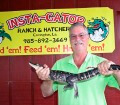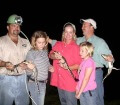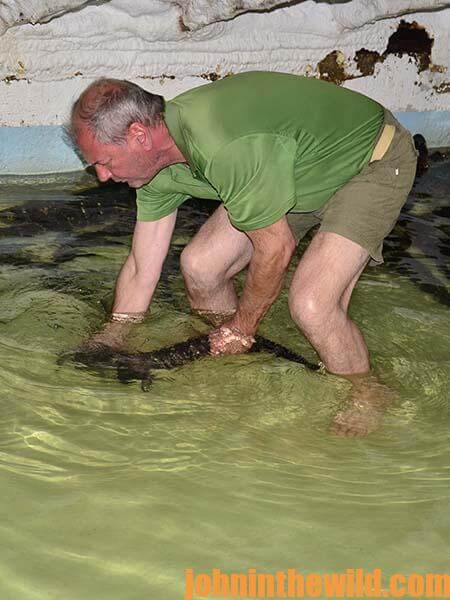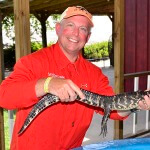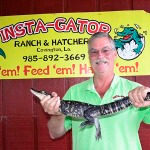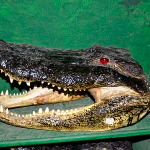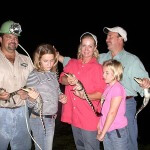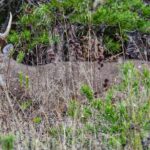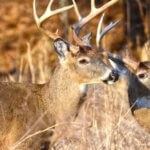John’s Note: John Price of Covington, Louisiana, is the classic example of someone who’s left corporate America and returned to the land to enjoy his freedom and his passion, and to conduct a business that provides an income for him and his family. Today the president and the owner of Insta-Gator Ranch and Hatchery (http://www.insta-gatorranch.com/ or call 888-448-1560 or 985-892-3669), Price once had been highly successful working in the oil and gas industry, buying leases from landowners in the Louisiana Delta for exploration and drilling. However, he regretted not having enough time with his family.
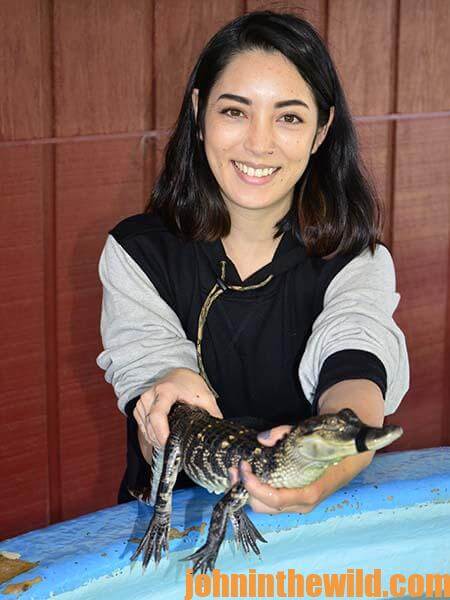 When Price announced to his family that he was leaving the oil and gas business to become an alligator rancher, their first reaction was, “Are you nuts?”
When Price announced to his family that he was leaving the oil and gas business to become an alligator rancher, their first reaction was, “Are you nuts?”
But Price’s family had faith and trust in him. Price collected about 1,000 eggs for an initial investment of about $5,000, hatched 868 eggs in his backyard in Metairie, Lou., and then moved his family and baby alligators to his current location in Covington. He located a spring on the land and drilled a well 2,300 feet deep to give his ranch 83 – 84 degree water that flowed at about 80 gallons per minute. This water temperature was the perfect one needed to raise alligators all year. “We quickly built our first alligator barn, since the LDWF requires alligator ranchers to raise their alligators indoors and keep the alligator barns at a minimum of 85 degrees,” Price says. During the winter months, Price heats his well-insulated barns with propane gas piped through water pipes under the barns’ floors.
Growing the Insta-Gator Ranch and Hatchery:
After raising his first crop of alligators, Price talked to other landowners he knew from working in the oil and gas business and used the skills he’d learned there to negotiate with them to harvest alligator eggs off their lands. “Once we had a written lease agreement with a landowner to harvest alligator eggs, we’d take that lease to the LDWF,” Price reports. “The state would give us a permit to harvest a certain number of alligator eggs. If we found more eggs than we were authorized to take, we told the LDWF. The next year the LDWF would give us a permit to harvest the number of eggs we could have gathered the previous year.”
The LDWF wants ranchers to take all the eggs they can from the wild, because the department knows that the return of alligators to the wild is much greater than the number of alligators that will survive if hatched in the wild. The LDWF keeps very good records of the number of eggs harvested from the properties that alligator ranchers have leased, the number of alligators released into the wild, and the growth of alligator nests each year.
To learn more about everything outdoors, click here and browse a variety of outdoor books by John E. Phillips.
John Phillips, winner of the 2012 Homer Circle Fishing Award for outstanding fishing writer by the American Sportfishing Association (ASA) and the Professional Outdoor Media Association (POMA), the 2008 Crossbow Communicator of the year and the 2007 Legendary Communicator chosen for induction into the National Fresh Water Hall of Fame, is a freelance writer (over 6,000 magazine articles for about 100 magazines and several thousand newspaper columns published), magazine editor, photographer for print media as well as industry catalogues (over 25,000 photos published), lecturer, outdoor consultant, marketing consultant, book author and daily internet content provider with an overview of the outdoors.

